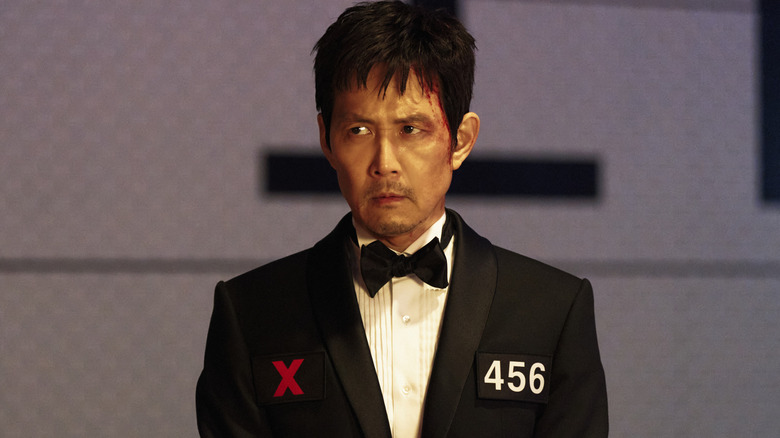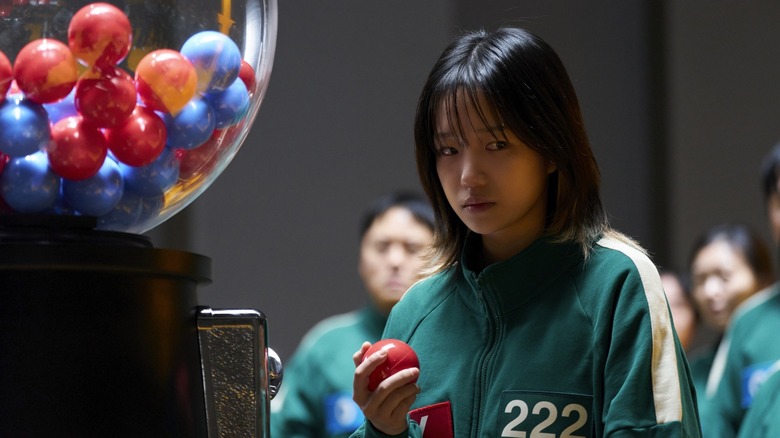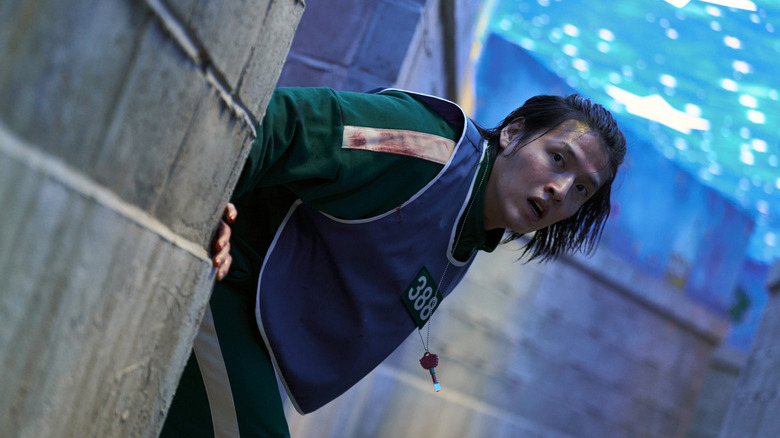Squid Game Season 3 Review: A Disappointing Ending For An Inventive Story
- Fantastic performances
- The sets for the games are phenomenal, especially the first game of the season
- The storyline around Jun-hee and her baby is ludicrous
- This season is all violent theatrics with little of the substance that made the show great before
Netflix has been guarded about letting critics see the final episodes of "Squid Game" — understandably so. After all, "Squid Game" has become the most-watched show of all time on the platform. I've seen all but one of the final episodes (5 out of 6 of the episodes in Season 3 were provided for me to review). Because I don't know the ending, it's hard for me to gauge how I feel about the season overall — though I do have some general impressions I can share with you.
After the failed rebellion at the end of "Squid Game" Season 2, Gi-Hun (Lee Jung-jae), the (supposedly) lone survivor, is delivered to the remaining players in a body box with a pink ribbon. The man is alive, but completely beaten. He doesn't try to interact with anyone. He just sits there, diminished, like there's no hope left.
Meanwhile, Guard 011 aka No-eul (Park Gyu-young) has gone out of her way to get Player 246, Gyeong-seok (Lee Jin-wook) — the father of the little girl who has cancer — out of the rebellion alive. And Hwang Jun-ho (Wi Ha-joon) and his team continue to look for the island from a boat piloted by Captain Park (Oh Dal-su), but Choi Woo-seok (Jeon Seok-ho), the man who was the survivor of the Salesman's (Gong Yoo) deadly game of rock-paper-scissors minus one, is getting suspicious that Captain Park has ulterior motives.
There's a lot going on, but as always, most of the focus is on the games — and this time we have some doozies, including the game with the mysterious boy mannequin we saw in the end credits scene of Season 2. These sets are enormous, fresh, and full of life, so it's almost a shame that they're used for such deadly purposes. In fact, if they weren't so brutal, I'd love to take my time going through them, especially the first one, which seems like a fully immersive, massive experience. But then it wouldn't be "Squid Game" if there wasn't something violent going on.
Catching up with last season's players
Because Gi-hun is in a state after his failure, other stories come into sharper focus. That's especially true when it comes to Jun-hee (Jo Yu-ri) and her baby. While in the second season people were barely able to detect Jun-hee's pregnancy, this season she is visibly pregnant. Given that no time at all has elapsed in the world of the show, this is improbable. The fact that she has a full-term baby in the second episode of the season is even more improbable, and the fact that she goes into labor and has the baby during the 30 minutes that the show allots for the game is a further improbability. Because of all of these issues and more, I hated this storyline — yet it got a lot of the show's focus in the last few episodes.
Also gaining focus are Jun-hee's ex-boyfriend Myung-gi (Im Si-wan) and his alliance with Nam-Gyu (Roh Jae-won), who is now taking deceased player Thanos' (Choi Seung-hyun) drugs; as well as Seon-nyeo (Chak Kook-hee), who has a band of four worshippers following her through the games.
But Gi-hun's vendetta against Kang Dae-ho (Kang Ha-neul) may be the most compelling story in the early part of the season. Gi-hun found out about Dae-ho's betrayal during the rebellion and blames him for its failure. While it would be one thing if Gi-hun felt he could talk to Dae-ho or Dae-ho made even an attempt to speak with Gi-hun, instead they stay away from one another until their clash during the games. Dae-ho explains some things, answering one question from the second season, but mostly we just get their vicious fight as they both try to give as good as they get.
Where's the social commentary?
Gi-hun and Dae-ho's fight is kind of thrilling but not nearly as much as anything in the first season, perhaps because now Gi-hun has plot armor, so we know the outcome. And that's one of the problems with many of the rest of the episodes. The idea of Gi-hun dying seems like a distant possibility at this point, so the other characters get more screen time because they might not make it. Even when he meets the Front Man (Lee Byung-hun) again for what the Front Man claims will be a longer conversation, he barely has anything to say. It's anticlimactic in the worst way.
As a result, this season is a melange of other stories, especially the one of Jun-hee and her baby. If you embrace this story, you may like this season better than I did, but if you, like me, think the baby's inclusion is ludicrous, you'll be as frustrated as I was. The baby seems to be an excuse to bring out either the best or (especially) the worst in humanity. Though some interesting things are brought up in relation to the infant, it's not nearly enough to make this plotline work. In fact, there's very little reference to the point of the show this season. We found out everyone's reason for being there in Season 2, and because of that, it seems that the showrunner, Hwang Dong-hyuk, has abandoned that for simple violent theatrics and heartrending deaths in the final season.
That said, I do feel I have to see the finale to completely assess Season 3. Though I have my suspicions about what will happen, I won't know until the last episode's credits roll. It's possible the finale will make all the difference, and this series will go out on a high note. I hope that happens, but I suspect it will be much like the rest of the third season: great entertainment, but not nearly as potent and full of social commentary as the first two installments.
"Squid Game" Season 3 premieres on June 27 on Netflix. If you need a refresher of the show before you dive into the final season, check out our recap video.


